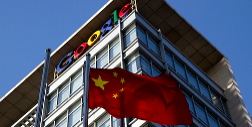Censorship cat and mouse
Google makes a fuss about Chinese censorship, but has always complied with other government's requests to remove content.

Image: CC BY-NC-SA 2.0 Flickr: hunxue-er (Josh Chin)
Google has withdrawn a feature which alerted Chinese users when they searched for a censored term. Previously this would cause them to be temporarily disconnected from Google’s services. A message appeared, stating that searching for this term (eg. “freedom”, but also intriguingly, “triangle”) could cut off your connection, and clarified that this was out of the search engine’s control. The tool was implemented by Google in May 2012 and made censorship more transparent to Chinese web users, as they could identify search terms which were flagged. I had the pleasure of stumbling across the list of banned search terms while researching this article.
Google has often been vocal in its opposition to censorship, and the alert tool showed they did not condone China’s “Great Firewall”. The government retaliated by blocking the feature, and Google responded by finding a way to bypass this. This game of cat and mouse continued until Google decided to embed the feature into its start page, meaning the Chinese authorities either had to block Google altogether or tolerate the alert feature.
All was well until In December 2011, when following weeks of aggressive blocking of Google’s services by the Chinese government, Google removed the offending feature. Google stated “Chinese officials consider censorship demands to be state secrets, so we cannot disclose any information about content removal requests.” Wired speculated that Google removed the feature to make the service more user friendly since it: “keeps getting them booted off the internet.” But this explanation makes no sense since the alert feature stopped them being disconnected if they searched for forbidden terms.
It is more feasible that Google complied to retain their corporate presence in the country, regardless of the amount of frustration it may cause internet users. Despite being criticised for being too accommodating to Chinese censorship, Google has good reason to keep on the right side the government. Even though a small percentage of Chinese people use Google as their default search engine, the vastness of the population means this is still a large number of people. Google has huge potential for growth in China and their shareholders know it. Google also has to consider revenue from both global companies advertise in China, and Chinese companies who advertise globally. This seems to be a more convincing reason for Google’s acceptance of China’s terms. For however much Google’s actions could characterise it as a protector of free speech, it’s primary motivation as a business will always be profit.
Worldwide 40 countries censor the internet in some way and Google states that some of its products are blocked in 25 of the 100 countries that it operates in. Most of us expect widespread censorship from authoritarian governments. What about the places which most consider to be the most free and open societies? In the US, Google censors search results to comply with legal complaints about the infringement of copyright. Since 2011, Google's auto-complete feature censors words connected with file-sharing, such as “bittorrent”, and swear words, (although it does not censor either from search results). Google’s image search also censors explicit content as a result of having removed a ‘no filtering’ option from the search options.
Google makes public the number of requests it receives to remove internet content (as well as the number of requests for individuals’ private data). These included US law enforcement agencies’ appeals for the removal videos from YouTube containing evidence of police brutality. Google refused to remove the offending videos, but did comply with 75% of all removal requests in the same six month period. The number of requests to remove information by US officials to Google more than doubled in the second half of 2011. “Figures revealed for the first time show that the US [government] demanded private information about more than 11,000 Google users between January and June [2011] almost equal to the number of requests made by 25 other developed countries, including the UK and Russia.” Google complied or partially complied with 90% of these requests in the same six month period.
The censorship in China exists to stop the spread of what the Chinese Communist Party would describe as dissenting views which they believe would damage the fabric of society. Parallels can be drawn between this and US law enforcement’s desire to remove images of police brutality from the internet. The reasons for wanting to remove the content seem to be similar, but the difference is in the extent of the censorship. While censorship may happen in “western democracies”, it is not as pervasive as in China.
Google does comply with some requests to remove content from the UK and US governments. These still involve value judgements about what should and should not be seen, what is deemed improper, or what we should be shielded from. It is this judgement, combined with an air of infallibility, that makes censorship so dangerous. Who is making decisions about what we can and can’t see, and why should we trust their judgement over ours?
You can test websites to see if they're censored in China at this website. Danya is a Communications and New Media Intern at the Open Rights Group.
Share this article











Comments

Latest Articles
Featured Article
Schmidt Happens

Wendy M. Grossman responds to "loopy" statements made by Google Executive Chairman Eric Schmidt in regards to censorship and encryption.
ORGZine: the Digital Rights magazine written for and by Open Rights Group supporters and engaged experts expressing their personal views
People who have written us are: campaigners, inventors, legal professionals , artists, writers, curators and publishers, technology experts, volunteers, think tanks, MPs, journalists and ORG supporters.






Comments (0)